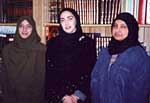By Laurel Druley
Minnesota Public Radio
January 16, 2002
|
| RealAudio |
Members of Rochester's Muslim community have taught Islam courses for years. Over the last few months the classes have grown very popular. Since Sept. 11, Americans have had a growing fascination with Islam.
| |
|
|
|
||
People in Rochester are filling up seats for a class with a simple name but a complicated task. Arzu Khalid and a small group of volunteers are teaching a class they call Know Your Muslim Neighbor. Over the last few months they have spent more than 300 hours explaining their Islamic beliefs and practices to church groups, schools and other community organizations.
Khalid says when she moved to the United States from Pakistan, she expected people here to know more about her faith.
"I came to the U.S. seven years ago. I was surprised. In our country when we were growing up, we would read the news and learn about the world and America - so I wasn't expecting that, but people knew far less," Khalid says.
Islam is the second largest religion in the world with 1.4 billion Muslims. That means every fifth person on the planet is Muslim. Muslims make up the majority of the population in 57 countries. In the United States there are about six million Muslims. In Rochester, the Islamic community is raising money to build a second mosque to accommodate their growing population.
|
"I came to the U.S. seven years ago. I was surprised. In our country when we were growing up, we would read the news and learn about the world and America...people (in the U.S.) knew far less."
- Arzu Khalid |
Khalid says she's surprised at the number of misconceptions Minnesotans have about Islam. She says she's constantly correcting the notion that any Muslim is a terrorist.
She also gets a lot of questions about the treatment of Muslim women. Rochester leaders attended a recent Know Your Muslim Neighbor class. They were curious about the traditional dress.
"People are very concerned about the head covering and the dress of Muslim women," Khalid says."In the Qu'ran, there is a commandment for men and women to be modest - to lower their gaze, guard your chastity. For women there is a special commandment to have an outer covering of loose clothing when you go out, so you will be known as Muslims."
Since the recent fall of Kabul and other large Afghan towns, some Afghan women have begun removing the all-enveloping burka. But others have chosen to keep wearing the garment, which covers them from head to toe.
"It's their culture," says Khalid. "Every country has their own specific thing. In Pakistan there's one big shawl. In Saudi Arabia every woman, even if she is not Muslim...must cover. That is not Islam, it's by the order of the king."
| |
|
|
|
||
Khalid tells the class according to the Qu'ran, men and women are equal before God. Muslim women can own propery and keep their earnings. And if a woman marries, she can keep her family name. Khalid says specific types of dress found in some Muslim countries are often cultural customs rather than religious-based traditions.
"The parallels are so similar to Christianity. I didn't know that," said Bonnie Adams, a teacher at Hayfield High School.
Adams attended a recent class with a group of other Rochester leaders, and says she looks forward to taking what she's learned back to her classroom. It wasn't just the treatment of women in Muslim countries that interested this group.
The students head from the classroom to the mosque. The women in the class cover their heads. It's late afternoon. About 40 men have gathered for prayer.
Muslims pray five times a day in Arabic. Women usually pray at home because it's their duty to take care of the children. Wherever they are, they face Mecca in Saudi Arabia. In Rochester that means they face northeast.
The students were also intrigued that the women prayed behind the men, to protect their modesty when they bend over.
The two-hour class is only a start to a greater understanding. These students of Islam - the high school teacher, the Salvation Army director, the Mayo Clinic researcher - all say they hope to take what they've learned and pass it on.
More from MPRMore Information


